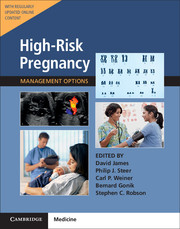Book contents
- Frontmatter
- Contents
- List of Contributors
- Preface
- Section 1 Prepregnancy Problems
- Section 2 Early Prenatal Problems
- Section 3 Late Prenatal – Fetal Problems
- Section 4 Problems Associated with Infection
- Section 5 Late Pregnancy – Maternal Problems
- 30 Substance Misuse in Pregnancy
- 31 Medication in Pregnancy
- 32 Hypertension in Pregnancy
- 33 Cardiac Disease in Pregnancy
- 34 Respiratory Disease in Pregnancy
- 35 Anemia and White Blood Cell Disorders in Pregnancy
- 36 Hematological Malignancies in Pregnancy
- 37 Thrombocytopenia and Bleeding Disorders in Pregnancy
- 38 Disorders of Coagulation in Pregnancy
- 39 Autoimmune Disease in Pregnancy
- 40 Diabetes in Pregnancy
- 41 Thyroid Disease in Pregnancy
- 42 Pituitary and Adrenal Disease in Pregnancy
- 43 Gastrointestinal and Liver Diseases in Pregnancy
- 44 Neurologic Complications in Pregnancy
- 45 Renal Disorders in Pregnancy
- 46 Spine and Joint Disorders in Pregnancy
- 47 Skin Disease in Pregnancy
- 48 Malignant Disease in Pregnancy
- 49 Pregnancy After Transplantation
- 50 Trauma in Pregnancy
- 51 Mental Health Disorders in Pregnancy
- Section 6 Late Prenatal – Obstetric Problems
- Section 7 Postnatal Problems
- Section 8 Normal Values
- Index
33 - Cardiac Disease in Pregnancy
from Section 5 - Late Pregnancy – Maternal Problems
- Frontmatter
- Contents
- List of Contributors
- Preface
- Section 1 Prepregnancy Problems
- Section 2 Early Prenatal Problems
- Section 3 Late Prenatal – Fetal Problems
- Section 4 Problems Associated with Infection
- Section 5 Late Pregnancy – Maternal Problems
- 30 Substance Misuse in Pregnancy
- 31 Medication in Pregnancy
- 32 Hypertension in Pregnancy
- 33 Cardiac Disease in Pregnancy
- 34 Respiratory Disease in Pregnancy
- 35 Anemia and White Blood Cell Disorders in Pregnancy
- 36 Hematological Malignancies in Pregnancy
- 37 Thrombocytopenia and Bleeding Disorders in Pregnancy
- 38 Disorders of Coagulation in Pregnancy
- 39 Autoimmune Disease in Pregnancy
- 40 Diabetes in Pregnancy
- 41 Thyroid Disease in Pregnancy
- 42 Pituitary and Adrenal Disease in Pregnancy
- 43 Gastrointestinal and Liver Diseases in Pregnancy
- 44 Neurologic Complications in Pregnancy
- 45 Renal Disorders in Pregnancy
- 46 Spine and Joint Disorders in Pregnancy
- 47 Skin Disease in Pregnancy
- 48 Malignant Disease in Pregnancy
- 49 Pregnancy After Transplantation
- 50 Trauma in Pregnancy
- 51 Mental Health Disorders in Pregnancy
- Section 6 Late Prenatal – Obstetric Problems
- Section 7 Postnatal Problems
- Section 8 Normal Values
- Index
Summary
Introduction: General Comments
Maternal and Fetal Risks
Serious maternal cardiac disease complicating pregnancy is relatively uncommon; however, it can have a significant adverse effect on maternal and fetal outcomes despite modern cardiac care. The overall prevalence of chronic heart disease complicating pregnancy is estimated to be 1.4% in the US. The proportion of pregnancy-related deaths associated with cardiovascular complications has been increasing, and cardiac disease is now the leading cause of maternal mortality in the US and the UK. During the last several decades, the etiology of heart disease in developed countries has changed from primarily rheumatic to predominantly congenital. Despite the potential for significant maternal morbidity, most patients with cardiac disease can expect a satisfactory outcome with careful antenatal, intrapartum, and postpartum management. Serious complications during pregnancy and the postpartum period such as congestive heart failure, arrhythmias, and stroke are seen in 12–20% of patients with cardiac disease. Mortality in some conditions can be as high as 30%. The rate of complications is related to several factors, including maternal functional status, myocardial dysfunction, left-sided lesions, and history of arrhythmias or a cardiac event.
Table 33.1 shows the estimated qualitative risk of maternal complications associated with various cardiac conditions. Maternal mortality secondary to heart disease is generally uncommon today, particularly in developed countries, because (1) most congenital lesions are diagnosed early, allowing appropriate surgical repair, (2) the incidence of rheumatic heart disease has significantly decreased, and (3) patients who are at greatest risk for cardiac decompensation are offered sterilization or termination. Normal physiologic pregnancy-related changes can aggravate underlying cardiac disease, leading to the associated morbidity and mortality. Total body water increases progressively during pregnancy by 6–8 L because an additional 500–900 mEq of sodium is retained. As a result, plasma volume increases steadily throughout the first two trimesters and into the early third trimester, reaching a plateau at approximately 32 weeks. In a singleton pregnancy at term, plasma volume is nearly 50% greater than that seen in nonpregnant women. Maternal cardiac output starts to increase at approximately 10 weeks and reaches a plateau by the early third trimester at levels 30–50% above nonpregnant values.
- Type
- Chapter
- Information
- High-Risk Pregnancy: Management OptionsFive-Year Institutional Subscription with Online Updates, pp. 900 - 943Publisher: Cambridge University PressFirst published in: 2017



